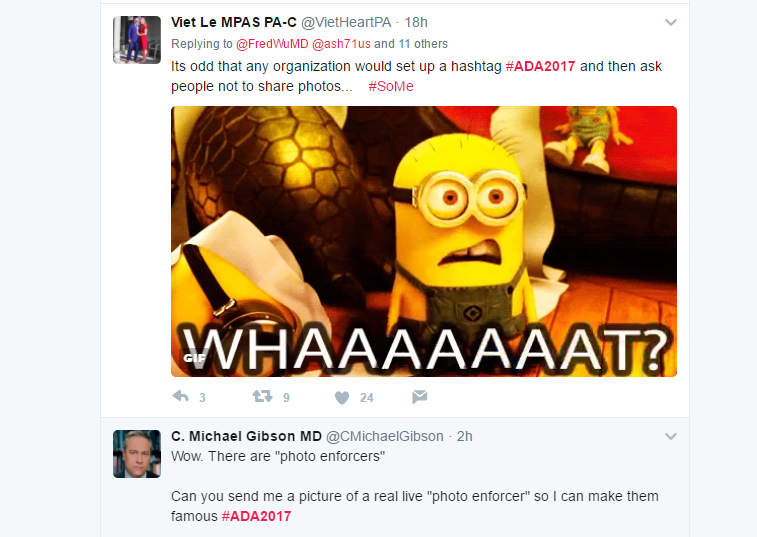ADA to re-evaluate tweet ban after backlash

The American Diabetes Association says it will re-evaluate its policy of banning photos and tweets of slides during presentations, after a backlash at its annual congress.
The #2017ADA and #ADA2017 hashtags shows anger at the “strong arm” tactics, which has overshadowed many of the discussions at the conference.
ADA says the measures are meant to prevent unauthorised sharing of copyrighted and (in some cases) as-yet unpublished medical data. But critics say the policy is hopelessly outdated in the age of social media, and blocks all the benefits of rapid, open sharing of data.
ADA went as far as having members of staff on hand during presentations to enforce the rules, which more or less banned photos or tweets containing slides at the conference without accreditation.
In ADA’s defence, other major healthcare conferences have introduced similar policies and there was also a work-around available whereby members of the press could apply, several weeks in advance, for photo accreditation.
But this did not stop widespread anger from those attending who advocate sharing of knowledge and ideas on social media, with many threatening to take photos of slides, or retweet them, in protest.
https://twitter.com/jedicath/status/873624560733753344
https://twitter.com/CMichaelGibson/status/873598461110865921
https://twitter.com/adamfeuerstein/status/873594421069004801
https://twitter.com/InsulinNation/status/873302439801368576
In its “Photography and Audiovisual Recording Policy”, the ADA states: “Taking photos of or recording the content of meeting room slides, poster presentations, and supporting materials is prohibited, considered intellectual piracy, and unethical. Attendees who ignore this policy will be at risk of losing their badge credentials.”
Journalists attending are also allowed to use voice recorders to assist with reporting, but publishing recordings could lead to credentials being revoked and a ban from future meetings.
In a statement, Linda Cann, the ADA’s senior vice president, professional services and education, said the organisation “understands and appreciated the desire to publicly share photos of research slides and posters presented at Scientific Sessions, especially considering today’s technology and the prevalence of instant communication via social media.”
But Ms Cann said presentations and posters are the legal property of research authors, and that many presentations include unpublished data.
She added that the ADA “must adhere to all local and federal laws,” and that “reversing this policy could unwittingly dismantle the long-standing discourse and engagement of medical and scientific research meetings around the world.”
This could “restrict medical research to being published in manuscripts” to protect authors’ legal ownership rights.
But Ms Cann added: “After this year’s meeting, we will re-evaluate the policy and our legal obligations to the researchers who present at Scientific Sessions.”











